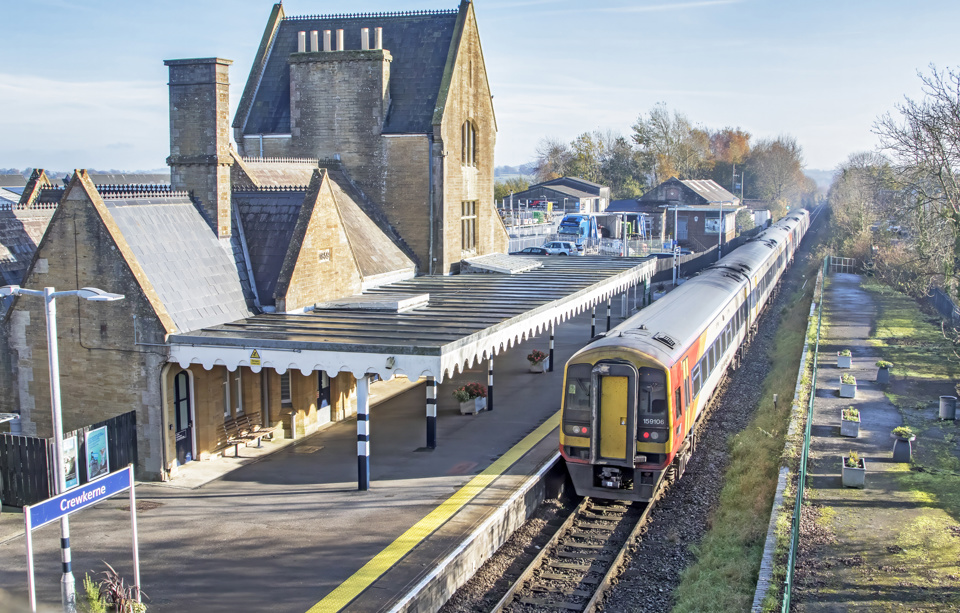Services between London Waterloo and Exeter will not call at Crewkerne from July 28 “until further notice” as the route struggles with unstable track.
Network Rail is warning that much more severe restrictions across the West of England line are inevitable in the coming weeks.
Services between London Waterloo and Exeter will not call at Crewkerne from July 28 “until further notice” as the route struggles with unstable track.
Network Rail is warning that much more severe restrictions across the West of England line are inevitable in the coming weeks.
Following the region’s driest Spring since 1836, and a forecast driest summer for 200 years, clay embankments between Salisbury and Axminster have cracked and shrunk, causing the rails to become uneven.
A speed restriction of 40 miles an hour is being imposed, initially over four miles of embankment between Crewkerne and Yeovil. To maintain the timetable, trains will not stop and buses will take passengers from the Somerset station to Axminster or Yeovil.
Network Rail said that “soil moisture deficit” had “disturbed the level of the tracks, meaning that trains cannot travel safely at their normal speeds”.
Tom McNamee, Wessex Route Infrastructure Director, told RAIL: “The last time this happened was 2022. Week on week, soil moisture deficit is 80% worse this year compared to last time.”
Moisture content in the clay embankments of southern England its already at its lowest since records started in 2009.
“We’ve had no rain,” he said. This is the first of what is likely to be a series of speed restrictions.
“We have daily cab-riding inspections by engineers at several other sites, and there is already evidence of clay shrinkage and clay collapse. We are heading towards an emergency timetable.”
McNamee, speaking for both Network Rail and South Western Railway (SWR), said that disturbed track could not be fixed until weather conditions change.
“We have done a lot in the lead-up. We have the best track geometry in years, with additional ballast drops and tamping. But if we tamp now while the clay is collapsed, it would last only a few days. This is a long-term project. Months, at least.”
“The outcry from Crewkerne residents has been extraordinary,” said Nick Hurrell of the Salisbury to Exeter Rail Users Group, SERUG.
“We made it clear there should be stops at Crewkerne, even if that means an amended timetable.”
Network Rail has previously stated that making its 6,000 clay embankments across southern England more resilient to a changing climate would cost £20-£30 billion, money that would never be available.
Improved monitoring and adapting service patterns to cope with hotter, drier summers and more intense winter rainfall is seen as the most effective action.
A repeat of the 2022 emergency timetable is likely, with long single-track sections from Tisbury to Gillingham, Gillingham to Templecombe and Crewkerne to Axminster restricted to 40mph.
That would mean services connecting Salisbury and Exeter reduced to once every two hours in each direction.
“We fear this will be repeated every summer from now on,” said Hurrell.
“They could cut the foliage back. Ten years ago the line was virtually free of foliage. Now it is completely overgrown. From Salisbury to Exeter the train is scratching along the hedges half the time. The hedges and the trees are just sucking out all the moisture.
“My view is that cutting them back would prevent these speed restrictions from being necessary.”
McNamee responded: “We’ve taken out hundreds of thirsty trees. They only play a small role. The much larger picture is about nineteenth-century embankments not built to modern standards, and not consistent as a base, slope or fill. It’s the inconsistency that is the problem, and it becomes about safety management as the ride becomes more bumpy.”
Hurrell warned that a two-hourly reduced-speed timetable will not be sufficient to carry all the passengers who need to travel, exacerbated by increasing reliability problems on the ageing Salisbury-based Class 159 diesel fleet.
“Sixty eight per cent of services are short-formed and 71% are late or cancelled,” he said.
“Every daytime train is meant to be six-car. A majority are now three-car. I understand from SWR that they just don’t have the spare parts to keep all the trains going.”
Login to continue reading
Or register with RAIL to keep up-to-date with the latest news, insight and opinion.



















Login to comment
Comments
No comments have been made yet.